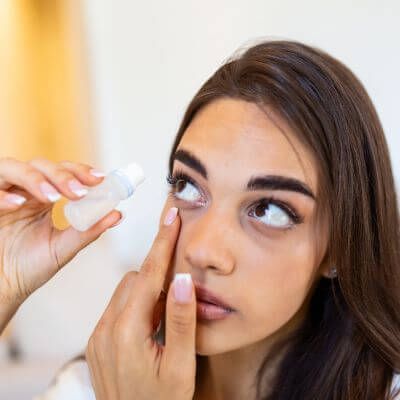Can Stress and Depression Damage My Vision?
According to the
Center for Disease Control
(CDC), over 7 million Americans have some type of impaired vision. Even more concerning is that 93 million adults in the U.S. are at risk of major vision loss. With these numbers expected to increase due to an aging population and chronic diseases, you need to take every step you can to protect your eyesight.
Stress and depression can damage your vision by increasing cortisol in the body. At unhealthy levels, it can affect your vascular and sympathetic nervous system, possibly leading to glaucoma, diabetic retinopathy, and age-related macular degeneration. Managing your stress and depression is key for healthy vision and overall wellness. Get regular comprehensive eye exams to catch vision problems early and protect your sight.
How Stress and Depression Damage Your Vision
Stress and depression can be a double-edged sword for your vision. Reduced vision can be tough on your mental health, but can that same mental toll actually make your eyesight worse? One significant study from 2018 found that may certainly be the case.
According to Prof. Bernhard Sable, director of the Institute of Medical Psychology at Magdeburg University in Germany, constant stress increases the level of cortisol in your body. Also known as the “ stress hormone ,” it’s crucial for:
- Regulating blood sugar levels
- Regulating your metabolism
- Reducing inflammation
- Assisting with memory construction
Unfortunately, stress and depression can lead to unhealthy levels of cortisol in your body. As Sable and his team point out, this can have a serious impact on your vascular and sympathetic nervous system (the source of “fight or flight” responses). Problems with these systems may eventually lead to the development of eye diseases.
While reduced vision and blindness are bad enough, the stress and depression that come with them can actually make problems worse. According to Professor Sable :
There is clear evidence of a psychosomatic component to vision loss, as stress is an important cause — not just a consequence — of progressive vision loss resulting from diseases such as glaucoma, optic neuropathy, diabetic retinopathy, and age-related macular degeneration.
Glaucoma
Glaucoma causes vision loss by damaging the optic nerve. This is caused by increased pressure within the eye, often due to the drainage system becoming clogged. Glaucoma can take years to become apparent. However, you will eventually notice peripheral vision loss, making it harder to see objects without looking directly at them.
Watch our video with Dr. Pruett to learn more about glaucoma!
Diabetic Retinopathy
Diabetic retinopathy occurs when high blood sugar levels damage blood vessels in the retina. These effects can be short-term, but they can also have long-lasting effects on your eyesight. It causes the blood vessels to swell, leak, grow irregularly, or even close. This can lead to reduced vision or even blindness if not diagnosed and treated.
To learn more about diabetes and vision, watch our video with Dr. Holt!
Age-Related Macular Degeneration
As our own Dr. Adam Carrera explains:
There are two main types of macular degeneration — dry and wet. As the name implies, it involves a breakdown or degeneration of the layers in the back of the eye where the retina is, as well as the cells that make that up. It also involves deposits of a protein called “drusen” that collects within the macula…Dry macular degeneration is far and away the most common form of AMD. 80-85% of patients have dry AMD, but severe vision loss doesn’t usually occur until much more advanced stages.
Watch the video below to learn more about age-related macular degeneration from Dr. Carrera!
Manage Stress To Protect Your Vision
Everyone will experience stress and depression from time to time. Now that you know their effects on your body, it’s even more important to learn how to cope with them and protect your overall health.
To manage stress , you can:
- Eat a healthy diet and drink plenty of water
- Get regular exercise
- Cut out tobacco products
- Practice relaxation techniques
- Reduce your triggers
- Set realistic goals and expectations
To manage your depression , try:
- Surrounding yourself with caring and supportive people
- Being supportive of others
- Staying in touch with family and loved ones
- Taking part in social activities even when you don’t feel like it
- Joining a support group
By learning to manage your stress and depression, you’ll be supporting a lifetime of healthy vision and overall wellness.
Comprehensive Eye Exams
The best way to catch vision loss early is with comprehensive eye exams. These dilated exams allow our team of ophthalmologists to get a detailed look at the structures of your eyes and catch issues such as glaucoma and age-related macular degeneration before significant vision loss occurs.
To learn more about the importance of dilated eye exams, click here !
Comprehensive eye exams are about more than just updating your prescription. They can also identify other health issues, including hypertension and autoimmune disorders. By getting regular comprehensive eye exams, you’ll be much better situated to address vision loss and protect your mental and emotional health by having a plan to treat it.
Are you ready to schedule your next comprehensive eye exam? Contact us today to schedule your appointment!
Stress and depression can have a huge impact on your eye health. They can increase the cortisol levels in your body, which can possibly lead to issues such as glaucoma, diabetic retinopathy, and age-related macular degeneration. Learning to manage your stress and depression can help protect your vision and overall health. With comprehensive eye exams, you can catch issues early, get treatment, and practice coping exercises to stay healthy.
Baptist Eye Surgeons is an ophthalmological practice in Knoxville, TN, and Morristown, TN. Give us a call at 865-579-3920 for more information or to schedule an appointment .


MORRISTOWN
SEVIERVILLE
TENNESSEE VALLEY - LASER CENTER
TENNESSEE VALLEY - EYE CENTER



